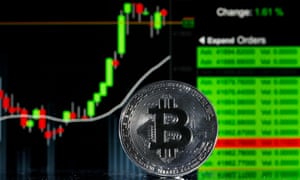Cryptocurrency is attracting attention from investors and financial regulators alike

What is bitcoin?
Bitcoin is a type of digital currency that emerged after the 2008 financial crisis. It allows people to bypass banks and traditional payment methods. It has become the most prominent among thousands of so-called cryptocurrencies.
It relies on “blockchain” technology, which is a shared database of transactions, with entries that must be confirmed and encrypted. The network is secured by individuals called “miners” who use high-powered computers to verify transactions, with bitcoins offered as a reward. There are more than 18m in existence, and the mathematical system controlling the generation of new bitcoins – which is decentralised and therefore has no overarching institution such as a central bank – has a hardwired maximum of 21m coins.
How do you buy and sell it?
There are several currency exchanges where consumers can swap traditional “fiat” money – backed by governments – for cryptocurrencies, which must be stored using a digital wallet. Some of the biggest exchanges include Bitstamp, Coinbase and Gemini. However, finance firms have also created new investment products based on bitcoin and other cryptocurrencies, such as contracts for difference, which are used to track the value of an asset without needing to directly own it.
What can you buy with it?
There are problems when it comes to using bitcoin as a currency, with many people simply owning it as a speculative investment instead, given its tendency for extreme swings in value.
Within the space of a single hour on Monday alone, its value fell by about $3,000 (£2,230), then rose again by about $2,000. This makes it almost impossible to put a reliable price on goods and services.
Instead, there are ways to pay using applications such as BitPay, which converts bitcoin funds in a digital wallet to pay for goods in traditional currencies used by retailers. Transactions are growing, more so online than in physical shops, with firms including Microsoft, Lush and Expedia accepting payments. The first-ever bitcoin transaction was made in 2010, when a Florida man paid a British man 10,000 bitcoins to order him two Papa John’s pizzas. Today that would be worth more than $300m.
Why is the FCA warning on cryptocurrencies
The City regulator is concerned crypto investment firms could be overstating potential payouts, or understating the risks, from investing in bitcoin and products related to the digital currency.
As a newer and relatively lightly regulated market, consumers are unlikely to have access to state-backed compensation if something goes wrong. There has also been a boom in bitcoin scams.
Why are people buying it right now?
There are three main factors influencing the bitcoin price. First, the media frenzy over its boom in value, drawing in new buyers looking to make money. Second, more traditional finance firms are investing in the market. And finally, comparisons between bitcoin and gold, which fit with trends in the global economy.
The development of Covid-19 vaccines could enable a swift economic recovery from the pandemic, at a time when governments and central banks are still providing vast amounts of emergency support – which could trigger a burst of inflation. Some investors view bitcoin as a store of value, similar to gold, which can hold its worth during times of economic stress or rising inflation.
Can its rise be maintained?
Bitcoin’s value is almost entirely defined by perceptions. Some economists believe it is entirely worthless. However, analysts at JP Morgan have said it could hit $146,000 if it became as established as gold for investors. However, to match this reputation built up over millennia – as a thing worth owning, with otherwise little intrinsic value – it would need to become much less volatile.
